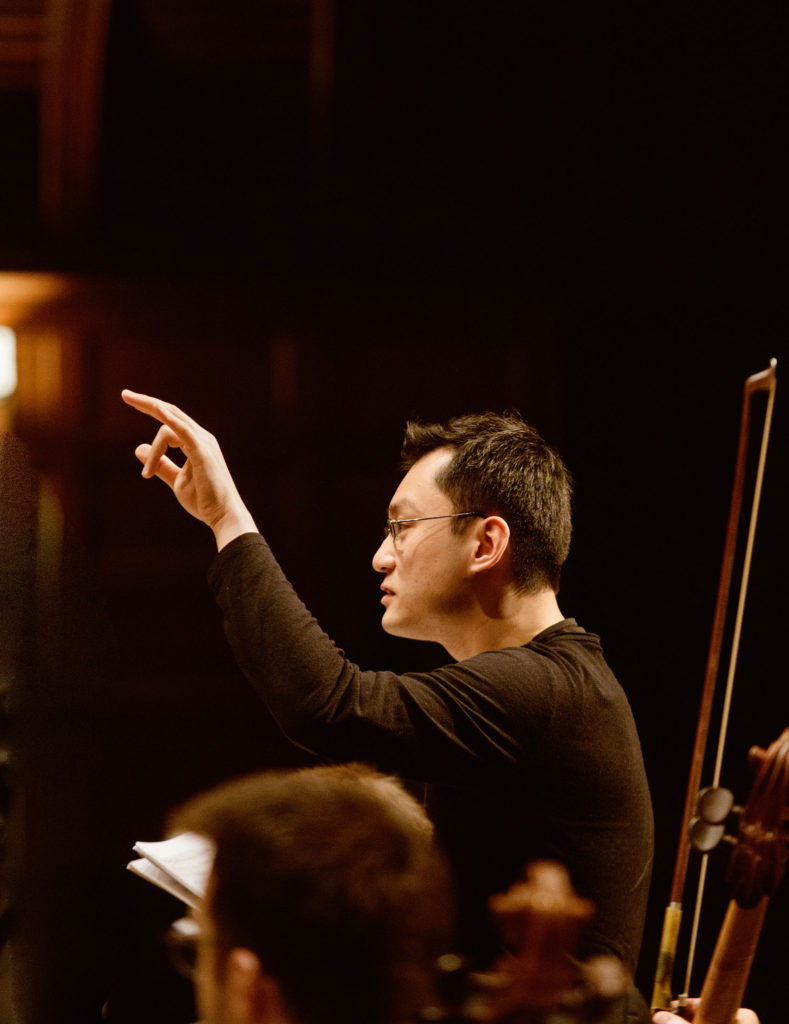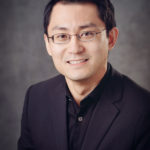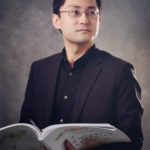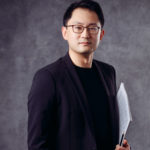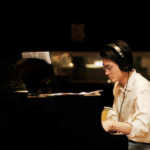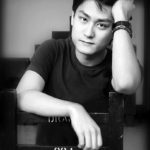Grammy-nominated Chinese-American composer Zhou Tian (JOH TEE-en) seeks inspiration from different cultures and strives to mix them seamlessly into a musically satisfying combination for performers and audience alike. The Wall Street Journal states his works “accomplish two important things: They remind us of how we got from there to here, and they refine that history by paying belated tribute to contributors who might otherwise be forgotten.”
His music—described as “absolutely beautiful…utterly satisfying” (Fanfare), “stunning” (the Cincinnati Enquirer), and “a prime example of 21st-century global multiculturalism”—has been performed by leading performers and orchestras, such as Jaap van Zweden, Yuja Wang, Manfred Honeck, Long Yu, Noah Bendix-Balgley, the New York Philharmonic, London Philharmonic, San Francisco Symphony, Pittsburgh Symphony, Mahler Chamber Orchestra, Melbourne Symphony, “The President’s Own” U.S. Marine Band, Tokyo Kosei Wind Orchestra, Dover Quartet, and the Shanghai Symphony, where he recently served as Artist-in-Residence. His Concerto for Orchestra, commissioned and recorded by Louis Langrée and the Cincinnati Symphony, earned him a GRAMMY Award nomination for Best Contemporary Classical Composition in 2018, making him the first Chinese-born composer and the second Asian composer (following Tōru Takemitsu) honored in that category. In 2019, Beijing Music Festival named him “Artist of the Year.” In 2022, he became the first Asian-American composer to win the coveted Sousa-ABA-Ostwald Award from the American Bandmasters Association for Sinfonia.
Born into a musical family in Hangzhou, China, Zhou moved to the US when he was 19. Trained at Curtis, Juilliard, and USC, he studied with some of America’s finest composers, such as Jennifer Higdon, Christopher Rouse, and Stephen Hartke. He is Professor of Composition at Michigan State University.
Zhou Tian is Pronounced “JOH TEE-en”
Note
The composer’s family name is Zhou and his given name is Tian. When only the last name is listed in the program, it should be listed as “Zhou.” The full name should be listed as “Zhou Tian.” The composer goes by Zhou (Joh), or formally, Dr. Zhou. Thank you.
full (and a very long) bio
Grammy-nominated composer Zhou Tian (JOH TEE-en) seeks inspiration from different cultures and strives to mix them seamlessly into a musically satisfying combination for performers and audience alike. The Wall Street Journal states his works “accomplish two important things: They remind us of how we got from there to here, and they refine that history by paying belated tribute to contributors who might otherwise be forgotten.”
His music—described as “absolutely beautiful…utterly satisfying” (Fanfare), “stunning” (the Cincinnati Enquirer), and “a prime example of 21st-century global multiculturalism”—has been performed by leading performers and orchestras, such as Jaap van Zweden, Yuja Wang, Manfred Honeck, Long Yu, Jian Wang, Noah Bendix-Balgley, the New York Philharmonic, London Philharmonic, San Francisco Symphony, Mahler Chamber Orchestra, Pittsburgh Symphony, Hong Kong Philharmonic, Melbourne Symphony, “The President’s Own” U.S. Marine Band, Tokyo Kosei Wind Orchestra, Dover Quartet, and the Shanghai Symphony, where he recently served as Artist-in-Residence.
His Concerto for Orchestra, commissioned and recorded by the Cincinnati Symphony and Music Director Louis Langrée, earned him a GRAMMY Award nomination for Best Contemporary Classical Composition in 2018, making him the first Chinese-born composer and the second Asian composer (following Tōru Takemitsu) honored in that category. In its review, American Record Guide wrote, “he is unafraid of monumental gestures, but at the same time he wastes nothing, whether notes or our time itself…The strings’ luster made me wish I could stop writing and just listen.”
Zhou’s recent premieres include:
Gift, a concert opener by the New York Philharmonic conducted by Long Yu (“A spectacular new piece…[it] sustains a concise, beautifully ordered narrative, yet is full of surprises. Long Yuʼs tightly focused direction matched Zhouʼs mastery of the colors of the orchestra, turning the performance into a triumph of musical universality as well as fine writing.”—Jon Sobel, Blogcritics). Commissioned by the Shanghai Symphony as “my gift to fellow musicians,” said Zhou, Gift have been performed by the London Philharmonic, Pittsburgh Symphony, Minnesota Orchestra, Baltimore Symphony, Juilliard Orchestra, among others.
Transcend, a symphonic work commemorating the 150th anniversary of the Transcontinental Railroad’s completion commissioned by a consortium of 13 American orchestras including the Utah Symphony, the Omaha Symphony and Reno Philharmonic (“Works like…Mr. Zhou’s orchestral piece accomplish two important things: They remind us of how we got from there to here, and they refine that history by paying belated tribute to contributors who might otherwise be forgotten” —The Wall Street Journal). The San Francisco Symphony under Earl Lee, and the New York Philharmonic under Long Yu performed the work in 2023 and 2024, respectively.
Double Concerto by acclaimed violinist Noah Bendix-Balgley and violist Shanshan Yao, with China’s Hangzhou Philharmonic conducted by Yang Yang.
Sinfonia for wind ensemble, commissioned by 13 leading university bands in the US, was selected as the 2022 Sousa-ABA-Ostwald Award winning composition, organized by the American Bandmasters Association and John Philip Sousa Foundation. Zhou become the first Asian-American winner in the award’s 66-year history.
Violin Concerto “Night Tour”, commissioned by the Shanghai Isaac Stern International Violin Competition. Considered one of the premier music competitions in the world with a US$100,000 top prize, the competition boasts a jury that includes Maxim Vengerov, Glenn Dicterow, and Ning Feng. “Night Tour” was premiered by six laureates of the Stern competition: Rino Yoshimoto (Japan), Thomas Lefort (France), Ruifeng Lin (China), Felicitas Schiffner (Germany), Angela Sin Ying Chan (Hong Kong, China), and Shannon Lee (USA). Subscription premiere by Ruifeng Lin with the Shanghai Symphony Orchestra conducted by Lü Jia.
Flute Concerto, commissioned by 7 symphony orchestras, premiered by acclaimed Mimi Stillman and “The President’s Own” United States Marine Chamber Orchestra under Col. Jason K. Fettig. (“A remarkable fusion of artistic mastery.” —The Flute View. “A beautiful painting in four scenes…not a single note could be sacrificed…a joyful triumph”—The Flutist Quarterly, National Flute Association).
Cello Concerto “Flowing Sleeves” by Deutsche Grammophon Artist Jian Wang with the Hangzhou Philharmonic and Singapore Symphony (“The musical language was rich, opulent, luxurious, infinitely varied and, at times, profoundly beautiful…This was a lovely performance of what deserves to become a classic of the cello concerto repertory.” —Marc Rochester, the Straits Times, Singapore).
And Trade Winds by the Grammy-winning ensemble Chanticleer across Europe and the US. One of the songs in the set, Strange how we can walk (in LA), was featured on Chanticleer’s latest album On a Clear Day, which received a five-star review from Gramophone.
Highlights of 2024-2025 include The New York Philharmonic, Pittsburgh Symphony, Omaha Symphony, and Ann Arbor Symphony (Transcend); the Shanghai Symphony, San Francisco Symphony, and Toronto Symphony (Concerto for Orchestra); the Minnesota Orchestra, Melbourne Symphony, Bochumer Symphoniker, New Jersey Symphony, Illinois Symphony, Juilliard Orchestra, and Eastman Symphony (Gift); the Baltimore Symphony and Guangzhou Symphony (Metropolis); the China Philharmonic and Guangzhou Symphony (Violin Concerto “Night Tour”); the Portland Symphony (Flute Concerto); the Shanghai Symphony (First Sight); the Hangzhou Philharmonic (Threads, Birthday Fantasia, and Double Concerto for violin and viola); and the acclaimed Tokyo Kosei Wind Orchestra (Sinfonia).
As the Artist-in-Residence with the Shanghai Symphony Orchestra for the 2019/20 season, Zhou worked closely with Music Director Long Yu and renowned guest artists such as Jaap Van Zweden, Ion Marin, and cellist Jian Wang on eight different orchestral works. He is the second composer to hold this title in the orchestra’s 140-year history.
In spring 2021, Zhou joined the Tianjin Juilliard School as the resident composer for the inaugural Festival Connect. His Flowing Sleeves for cello and piano quintet, co-commissioned by the Juilliard School and TJS, received its world premiere led by faculty cellist Yeonjin Kim.
Other notable performances have come from the Pittsburgh Symphony (Manfred Honeck; Daniel Meyer), Minnesota Orchestra (Osmo Vänskä; Sarah Hicks), Basque National Orchestra and Osaka Philharmonic (Robert Trevino), Houston Symphony, Indianapolis Symphony, Hong Kong Philharmonic, China National Center for the Performing Arts (NCPA) Orchestra, Guangzhou Symphony, China Philharmonic; The Munich Philharmonic (Chamber Series); pianist Yulianna Avdeeva, violinists Chloë Hanslip and Caroline Goulding, violist Roberto Díaz, flutists Jeffrey Khaner, guitarist Jason Vieaux; the string quartets of Arditti, Dover, Jasper, American, and Woodward; Sybarite5, Empire Brass, Eroica Trio; Tanglewood Festival Chorus.
Other commissions include Rise, inspired by diary entries of the American soldiers during World War I commissioned by the Allentown Symphony (Diane Wittry), Spokane Symphony (James Lowe) and Erie Philharmonic (Daniel Meyer) with support from the National Endowment for the Arts in honor of the 100th Anniversary of Armistice Day; Trace (“Lush, neo-impressionistic” —the Cincinnati Enquirer) by the Cincinnati Symphony under Mei-Ann Chen; Broken Ink, a 30-minute, multi-movement meditation on Song Dynasty poetry premiered by Princeton Symphony under Rossen Milanov; Viaje (voyage) for flute and strings by Dolce Suono Ensemble and featured on American Public Media’s Performance Today—of which the Philadelphia Inquirer wrote “[it] fused the composer’s Chinese American sensibility with the lore of ancient Spain so convincingly that the exotic flute solos for [Mimi] Stillman sounded like the most natural thing in the world.”
The Grand Canal, a kaleidoscopic large-scale work mixing together two traditional Chinese instrumentalists (erhu and ruan), a Chinese opera singer, and a full symphony orchestra with chorus, was performed during a nationally televised celebration of the 60th anniversary of the founding of the People’s Republic of China. It received its US premiere by the Princeton (NJ) and Columbus (OH) symphonies under Rossen Milanov, and its European premiere by Ireland’s RTÉ National Symphony under Jiamin Song.
Among his awards and honors are a Grammy nomination for Best Contemporary Classical Composition, a Sousa-ABA-Ostwald Award, the Indianapolis Symphony Orchestra Glick Award, the Minnesota Orchestra Composers Institute, first prize in the Washington International Competition for Composers, first prize in the ASCAP/Lotte Lehmann Art Song Competition, Symphony in C Composers Award, American Composers Orchestra Underwood Readings, Presser Music Award, three ASCAP Morton Gould Young Composers awards, finalist for the Charles Ives Living award given by the American Academy of Arts and Letters, and a William J. Beal Outstanding Faculty Award from the Michigan State University in recognition of his extraordinary creative accomplishments and dedication to serving students, colleagues, and the institution. Many of Zhou Tian’s commissions are supported by grants from the National Endowment for the Arts. In 2019, Beijing Music Festival named him “Artist of the Year.”
Zhou’s music has been performed repeatedly at prestigious venues around the world, such as Carnegie Hall and Lincoln Center in New York, the Kennedy Center for the Performing Arts in Washington D.C., and National Centre for the Performing Arts in Beijing. He has served as composer-in-residence with the Shanghai Symphony, the Tianjin Juilliard School, Reno Philharmonic, Musikene Centro Superior de Música del País Vasco (Spain), and Chicago’s Music In the Loft concert series. His works have been broadcast on NPR, PBS, and recorded on Cedille, Innova, Signum, Fanfare Cincinnati, Archimusic, and Pacific records.
Outside of the classical arena, Zhou has composed music for film, dance, and crossover. He started playing piano in numerous recording sessions and arranging all kinds of music when he was 12, often working with his father, who was a busy composer of television shows. When he was 17, his interest in Jazz led to the creation of Duet for flute and piano, which earned him an Honorable Mention at the 1999 Julius Hemphill International Jazz Composition Awards. His score for Eternal Beloved, a major Chinese studio film about love and afterlife—described as “a pristine look and delicate tone…that’s beautifully matched by Zhou’s warm, restrained score” (Variety)—received critical acclaim since the premiere at the Shanghai International Film Festival. His award-winning crossover albums put Chinese folk music on a spin by mixing performance and technology. In 2021, A Woman’s New World, a documentary film about a woman conductor’s life and career for which Zhou composed the original score, won the Best Documentary at the French Riviera Film Festival.
Born into a musical family in 1981 in Hangzhou, China, Zhou moved to the United States at the age of 19. He trained at the Curtis Institute of Music (B.M.), the Juilliard School (M.M.), and the University of Southern California (D.M.A.), studying with Jennifer Higdon, Richard Danielpour, Christopher Rouse, Stephen Hartke, and Donald Crockett. He has held composition fellowships from Tanglewood, Aspen, the American Conservatory at Fontainebleau, and the Henry Mancini Institute. He previously taught at Colgate University and is currently Professor of Composition at Michigan State University.
Note
The composer’s family name is Zhou and his given name is Tian. When only the last name is listed in the program, it should be listed as “Zhou.” The full name should be listed as “Zhou Tian.” The composer goes by Zhou (Joh), or formally, Dr. Zhou. Thank you.
